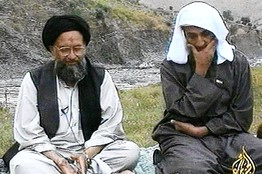 Osama bin Laden and the deputy leader of al Qaeda “parted ways” six years ago, a senior Pakistani intelligence official said Thursday.
Osama bin Laden and the deputy leader of al Qaeda “parted ways” six years ago, a senior Pakistani intelligence official said Thursday.
The official said bin Laden had been “marginalized” by his deputy, Ayman al-Zawahiri, who helped bin Laden found al Qaeda in 1988 and led its operation in Afghanistan and Pakistan. He added that bin Laden had been sidelined because he no longer had the funds to support al Qaeda operations and that his popularity in the network was slipping. “They had parted ways some six years ago,” he said.
Portraying bin Laden as sidelined within al Qaeda could help Pakistan’s reputation in the aftermath of his death by implying that he had little to do with al Qaeda or its recent attacks—suggesting that Pakistan’s failure to find him wasn’t such a significant lapse. Pakistani officials have expressed embarrassment that the U.S. found bin Laden in Pakistan and are probing the intelligence failure.
U.S. officials say they have not heard of a split between the two men.
“Parted ways? I don’t think so,” said one U.S. counterterrorism official. “I have not seen anything like that” in intelligence reports.
Another U.S. official familiar with the intelligence said there was strong evidence, however, to support the contention that bin Laden had money problems. “We do know funding has been an issue,” the official said.
Mr. Zawahiri has long been viewed as al Qaeda’s chief ideologue and operational commander, with bin Laden seen as the mastermind and inspiration of the organization with a much less active day-to-day role.
Bin Laden’s personal fortune and contacts to other rich Arabs were his calling cards when he started supporting Mujahedeen fighting in Afghanistan in the early 1980s. In recent years, though, al Qaeda faced a cash crunch even as affiliates, such as one in north Africa, earned millions of dollars through kidnapping.
Mr. Zawahiri is believed to be operating from a base in the Pakistani tribal regions, where bin Laden also was presumed by many to be. A rift could help explain why bin Laden moved to the compound in Abbottabad, 40 miles from Pakistan’s captial, where he was killed in a raid by U.S. forces in the early hours of Monday local time.
That compound was built six years ago, around the same time the two men were said to have split. Bin Laden and several family members moved in around five years ago, Pakistani officials say.
Records from interrogations of detainees at Guantanamo Bay, Cuba, show that Mr. Zawahiri moved residences in May 2005 to what was described as “a good place owned by a simple, old man.”
Mr. Zawahiri was an Egyptian doctor and head of a radical jihadist group when he joined with bin Laden to create al Qaeda. Pakistani officials said Mr. Zawahiri was behind most of the al Qaeda attacks in Pakistan.
Tensions between bin Laden and Mr. Zawahiri rose around 2005 after the U.S.-led invasion of Iraq prompted the creation of a new affiliate group, al Qaeda in Iraq, led by a bloodthirsty Jordanian named Abu Musab al Zarqawi.
The Iraqi affiliate promptly unleashed a brutal campaign against Shiites in Iraq, including attacks on Shiite mosques, which horrified many Iraqis and undermined al Qaeda’s efforts to win over the local population. That backlash eventually led to the so-called Sunni Awakening that helped U.S. forces regain the upper hand in many Iraqi provinces.
Bin Laden and much of al Qaeda leadership recoiled at Mr. Zarqawi’s tactics. Mr. Zawahiri acknowledged the “heresy” of Shiites and gently chided him, according to a 2005 letter from Mr. Zawahiri found when U.S. forces killed Mr. Zarqawi.
Mr. Zawahiri, 59, is viewed as bin Laden’s accepted successor. According to al Qaeda documents assembled by U.S. researchers, leadership succession inside the terror group is clearly laid out: The group’s deputy will assume control if the leader is captured or killed.
Leah Farrall, an Australian counterterrorism expert and authority on al Qaeda’s organization, notes that would make Mr. Zawahiri the default leader pending his full, formal election by al Qaeda’s leadership council. The oath of loyalty sworn by al Qaeda members is to the position of leader—not to an individual, she notes. That means Mr. Zawahiri, though viewed by U.S. officials as less charismatic than bin Laden was, would enjoy fealty from al Qaeda members.
Mr. Zawahiri has been considered by many counterterror experts the more radical of the pair. In statements and books, he attacked Iran, Egypt’s Muslim Brotherhood, Hezbollah, Hamas and other radical Islamists that bin Laden preferred to keep under a broader jihadist umbrella.
Mr. Zawahiri became a jihadi at 15, served time in an Egyptian prison for his role in the 1981 assassination of Anwar Sadat and ratcheted up the violence level inside Egypt.
In 1997, when other Egyptian jihadi groups renounced violence, he orchestrated the deadly attack on foreign tourists in Luxor. He angrily attacked fellow prominent Egyptian radicals who later recanted their extremist views.
Many of al Qaeda’s most audacious moves—including the embrace of suicide bombings, the killing of fellow Muslims and the quest for weapons of mass destruction—were the work of Mr. Zawahiri.
In the wake of bin Laden’s death and in the face of persistent questions about whether Pakistan intelligence provided any type of support to bin Laden, Pakistani officials have insisted they contributed information about bin Laden that helped lead U.S. forces to his door—a point President Barack Obama mentioned in a televised address about bin Laden’s death.
Pakistani officials said Thursday that they had shared with the U.S. some intelligence on bin Laden as recently as April but conceded that their own intelligence agents couldn’t locate his compound.

Leave a Reply
You must be logged in to post a comment.